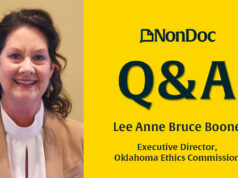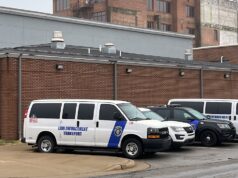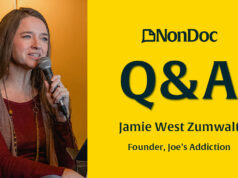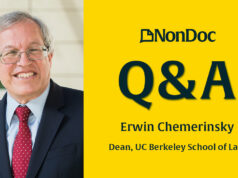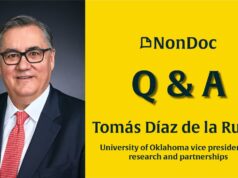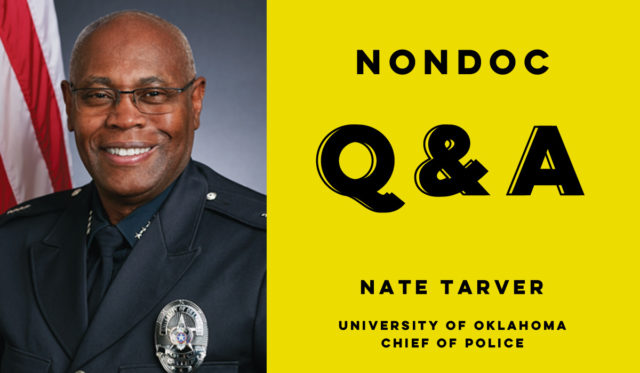
When he was studying broadcast journalism at the University of Oklahoma, Nate Tarver had no idea he would one day serve as chief of police across all three OU campuses.
Tarver was named OU’s chief of police in September 2020, succeeding former Chief Liz Woollen, who held the position for 17 years. Prior to joining the OU Police Department in 2015, Tarver had worked for the Moore Police Department and the Oklahoma City Police Department. His career has included induction into the Oklahoma Law Enforcement Hall of Fame.
In the following Q&A, Tarver discusses his unorthodox entry into law enforcement, his most challenging moments, his belief that people should be open-minded and the potential for a body-camera program for OUPD officers.
Answers have been edited lightly for clarity and style.
Where did you grow up, and what led you to pursue a career in law enforcement?
I was born and raised in Tulsa. I was the eighth of 10 children. I am the first in my family to attend college. It was happenstance that I ventured into law enforcement. I was in the City of Moore building paying a utility bill when I observed that they were hiring. I had no previous inclination or desire to be a police officer. At the time, I was just seeking employment. Once I was in the job, I knew this was my calling. I had no idea I’d be as successful with it as I have been.
If I’m not mistaken, you were a journalism major at the University of Oklahoma. How did that experience shape your perspective on communicating with the media and the public as a chief of police?
I had originally enrolled as a pharmacy major. I quickly realized math and science were not my friends. I then switched majors to broadcast journalism. As a senior at OU, I did a stint as a DJ for KGOU when it was a progressive rock station. When I worked at Moore PD, they all knew I had a journalism degree. It was a big deal to them because there were only two or three officers who had degrees. So when the media came around, the supervisors would push me out front to talk to them. They were amazed that I was so “articulate.” Being a journalism student, I felt it necessary to boost my vocabulary. This actually gave me a glimmer of empowerment while traversing the racially contentious environment I found myself in.
My journalism background has made me more comfortable, in that I had a better idea of what the media was looking for. That’s not to say that I didn’t make mistakes, because I did. However, my real experience came from being the public information officer for the Oklahoma City Police Department for almost four years. I was involved in many news conferences and detailed many high-profiled crimes and natural disaster events. I have spoken to media agencies from across the country and the world. Working for the university does not afford me the opportunity to speak as much with the media, however, I have spoken to many university-affiliated groups. I have also had the pleasure of being a keynote speaker at a couple of events.
Tell us a little about your career at OU. What have you learned along the way to becoming chief of the university’s entire police department?
It has been an honor to serve this university in the capacity of associate vice president and chief of police. I began my police career with OU in August 2015. I was not looking for a job, but I met Ken Rowe, vice president for administration and finance for the Health Sciences Center campus. At that time, the current chief told me they were looking for a deputy chief, and he asked me if I would have lunch and meet Ken. We conversed over lunch. Ken told us this was not an interview, but just a meeting.
About a month after our meeting, I was given a job offer to be the deputy chief. Sixteen months later, the previous chief decided to retire. Ken called me in and offered me the OUHSC chief’s position effective Jan. 1, 2017. In 2019, the university hired Eric Conrad as vice president and chief operations officer. The police departments from all campuses were placed under his direction. In January 2020, the chief of the Norman campus retired. Eric approached me to be the chief over all campuses. I declined because I couldn’t see myself being up to the task. There was a national search conducted for that position. Numerous candidates from in state and out of state were evaluated. Finally, a candidate was chosen. However, when offered the job, the candidate declined. Eric decided rather than taking the No. 2 candidate, he would approach me again. After much thought, I accepted and became the first chief of police for all OU campuses.
What I have learned is that each campus has its own unique qualities and issues. At the same time, each campus police department has some similar issues. The most overriding thing I have learned is that we have quality officers on each campus who are just as talented, dedicated and professional as any officer I have worked with during my time with both the Moore and Oklahoma City police departments. I also have chiefs on each campus who are just as talented and capable as I am, and they keep each campus operating smoothly. I am blessed to have them.
What has been the most challenging moment of your career?
There have been many challenging moments. The first was learning to be a police officer while navigating the hate being spewed by some co-workers and citizens of Moore. Challenges of not knowing if those officers would help if I got in trouble. Challenges of trying to be a good father to my daughters when I couldn’t always be there with them. Challenges of dealing with all the images of grief, injuries and death. Especially the children. Then there are death notifications. The biggest challenge is remaining optimistic while all those visions are stored in your mind. Then going to the next call or issue without carryover.
As a Black man leading a law enforcement agency, what perspective can you share about officer training on topics like implicit bias? Broadly speaking, what can and should be done to improve trust between law enforcement agencies and the communities they serve?
Officer training is very important. Many people in general see themselves as very well-rounded and perhaps feel there is not much more for them to learn regarding race relations or human relations for that matter. I truly believe we all have a lot to learn because those dynamics are ever evolving. Throughout my career, I have applauded those individuals who felt comfortable enough to ask questions. It is about perspective and being open-mindedly objective. That is harder to do in reality than most will admit.
For me, those things I just said are what should be done to improve the trust between law enforcement and the communities. Our police agencies should work more to improve supervision, transparency and accountability. The community needs to understand that law enforcement can’t work unless the community is involved. They have to be the eyes and ears for information the police need to help prevent and solve crimes.
Our leaders should do what they can to learn about the agencies they oversee. I believe current and prospective city council members, mayors and city managers should go through police departments’ citizen academies, ride along for several different shifts and ask questions. Another thing people must do, both citizens and police officers, is realize that not all issues are black and white. We live in a gray society. Some people are victims of their circumstances, however, their circumstances are not always of their own makings or decisions.
We sometimes get stuck in doing things the way we have always done them. When presented with obstacles to how we have always done them, we lash out in anger or frustration. An example is when there is a traffic delay and people become frustrated because this route is the only route they know. They always go this way. However, if they had turned left or right a few blocks sooner, they could have avoided the situation. Though it may have taken them several blocks out of the way, they would have arrived at their destination sooner. Thus, there can be more than one right way, and what is right for you may not be right for everyone else.
I once thought all laws were black and white. But I have learned that there is a lot of gray in the enforcement of laws. I think this is why training in implicit bias, emotional intelligence, crisis intervention and other topics is important. Unfortunately, just taking courses will not change the thinking or hearts of all who attend. We must be open-minded to views other than our own.
Are OUPD officers currently equipped with body-worn cameras? If not, has there been any discussion with the university administration about whether that technology would be beneficial for your department?
OUPD officers are not equipped with body-worn cameras at this time. There is discussion of obtaining them, and cost is a big factor. This technology would be very beneficial for the officers and our campus community. We do have dash cameras in our patrol cars and are looking forward to the time we can implement the body-worn cameras.
Sexual assault is an issue on every college campus in America. What steps can be taken to reduce sexual assaults while also encouraging reporting of incidents? What messages do you and your department preach to OU community members about consent and individual safety?
Unfortunately, you are correct about sexual assaults on campus. Sexual assaults are an issue, which is a very sad reality. Education about these events is ongoing and continuous. I believe our student affairs, student housing and police department do an admirable job of messaging and education. However, we are not seeing the results we would like.
I continually hear that many believe the police and the university will not do anything if incidents are reported. This belief is profoundly untrue. We have yet to figure out why this belief even exists. We do receive a number of third-party reports through our Campus Security Authorities. The vast majority of these reports indicate that the victim and reporting parties want to remain anonymous and specify that they don’t want to be contacted by the police or student affairs.
In hopes that your readers will not take this the wrong way, I will say this: I would like our potential victims to be more in the mindset of not being victimized. Going to parties is not a bad thing. Going to parties and drinking beverages from unknown origins could be risky. Being alone with someone you don’t really know could be questionable, especially after drinking beverages from unknown origins. Having an accountability partner and a pre-designated plan of action could help. Learn to be assertive and recognize when you are in an uncomfortable situation and trust your conscience when it says danger is ahead. Lastly, please trust campus resources so we can help students and any other potential victims.
If you had to compete on an episode of America’s Got Talent, what skill or ability would you show off?
I would be a comedian. Yep, I think I am funny, even though my daughters don’t agree.











